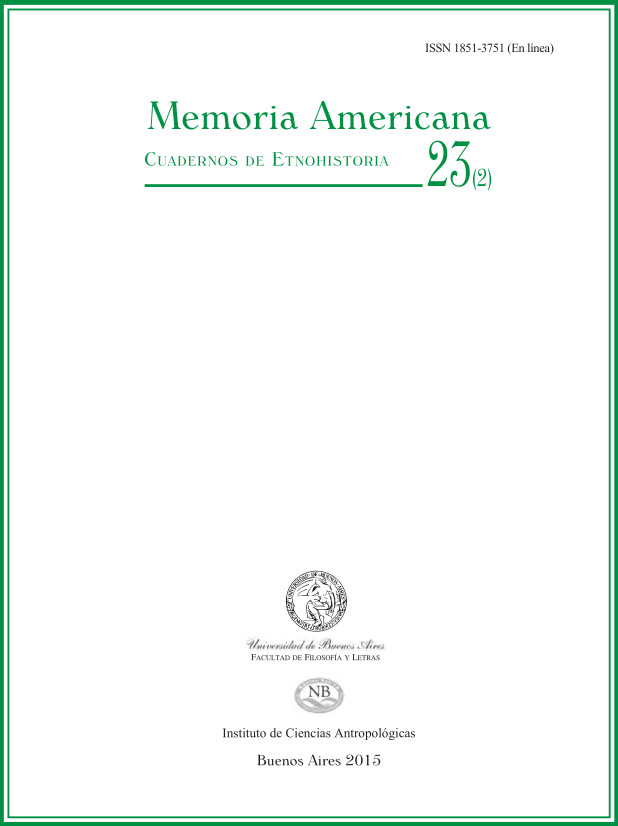Ambrosio O’Higgins and the Hispano–Mapuche ‘Parlamentos’, 1771-1803: indigenous policy, administrative writing and culturallinguistic mediation in the bourbon era in chile
Abstract
Post-jesuit spanish-chilean indigenous policy was marked by the pragmatism of the new authorities promoted by the bourbon regime, among which the figure of Irish immigrant Ambrosio O’Higgins standsout. O’Higgins’ actions at the mapuche frontier are to be understood as an expression of his rationalism and pragmatism, which resulted in a certain degree of recognition of the modes of existence of insubordinatemapuches, as a means of attaining the ultimate goal of peaceful coexistence -without which the frontier trade and prosperity would not have been possible. The intense negotiation and mediation activity duringthe 1771-1803 O’Higgins mandate is reflected in the Hispano-indigenous frontier parlamentos carried out during that period. This article approaches the period in question by analyzing the particularities ofHispano-Mapuche relations and indigenous policy from O’Higgins’ perspective, and his influence on both the parlamentos as well as the team of mediators that took part in them.Downloads
References
Amat y Junyent, Manuel [José Perfecto Salas] 1924-1928. Historia Geográfica e Hidrográfica con derrotero general correlativo al Plan del Reino de Chile. Revista Chilena de Historia y Geografía 53 al 62. (1924 y 1928 respectivamente).
Arias de Saavedra, Inmaculada 2000. Irlandeses en la alta administración española del siglo XVIII. En: Villar García, M. B. (coord.); La emigración irlandesa en el siglo XVIII: 41-61. Málaga, Universidad de Málaga.
Bravo, Bernardino 1989. Los hombres del absolutismo ilustrado en Chile bajo Carlos III: Formación de una minoría ilustrada alrededor de la Administración, la Judicatura y el Ejército. En: Campos Harriet, F. et al.; Estudios sobre la época de Carlos III en el reino de Chile: 297-373. Santiago, Ediciones de la Universidad de Chile.
Boccara, Guillaume 1998. Guerre et ethnogenèse mapuche dans le Chili colonial: l`invention de soi. Paris, L´Harmattan.
Boccara, Guillaume 1999. Organisation sociale, guerre de captation et ethnogenèse chez les Reche-Mapuche à l´époque coloniale. L´Homme 150: 85-118.
Campos Harriet, Fernando 1989. Los gobernadores del Reino de Chile bajo Carlos III. En Campos Harriet, F. et. al.; Estudios sobre la época de Carlos III en el reino de Chile: 13- 78. Santiago, Ediciones de la Universidad de Chile.
Chauca García, Jorge 2006. La frontera araucana. Diario del parlamento de negrete (1792-1793). Brocar: Cuadernos de investigación histórica 30: 207-240.
Contreras Painemal, Carlos 2007. Koyag: Parlamento y protocolo en la diplomacia mapuchecastellana, siglos XVI-XIX. Berlín, Centro de Investigación y Documentación Chile- Latinoamérica.
de Jong, Ingrid 2002. Indios, nación y soberanía en la cordillera norpatagónica: fronteras de la inclusión a la exclusión en el discurso de Manuel José Olascoaga. En: Nacuzzi, L. (comp.); Funcionarios, diplomáticos, guerreros. Miradas hacia el Otro en las fronteras de Pampa y Patagonia (siglos XVIII y XIX): 159-201, Buenos Aires, Sociedad Argentina de Antropología.
Donoso, Ricardo 1941. El Marqués de Osorno Don Ambrosio Higgins, 1720-1801. Santiago, Publicaciones de Universidad de Chile.
Febrés, Andrés 1765. Arte de la lengua general del Reyno de Chile, con un diálogo chileno- hispano muy curioso: a que se añade la doctrina christiana, esto es, rezo, catecismo, coplas, confesionario, y pláticas, lo que más en lengua chilena y castellana: y por fin un vocabulario hispanochileno, y un calepino chileno- hispano más copioso. Lima, Calle de la Encarnación.
Foerster, Rolf 2008. Del pacto colonial al pacto republicano. Revista TEFROS 6 (1): 1-6. Gay, Claudio 1854. Atlas de la Historia Física y Política de Chile. París, Imprenta de E. Thunot.
Grupo Alfaqueque (VV.AA.) 2010. Los límites de Babel. Ensayos sobre la comunicación entre lenguas y culturas. Madrid/ Frankfurt, Iberoamericana Vervuert.
Lázaro Ávila, Carlos 1996. Los tratados de paz con los indígenas fronterizos de América: evolución histórica y estado de la cuestión. Estudios de Historia Social y Económica de América 13: 15-24.
Lázaro Ávila, Carlos 1999. Conquista, control y convicción: el papel de los parlamentos indígenas en México, el Chaco y Norteamérica. Revista de Indias 217: 645-673.
León, Leonardo 1992. El pacto colonial hispano-mapuche y el parlamento de 1692. Nütram 30: 27-53.
León, Leonardo 1993. El parlamento de Tapihue 1774. Nütram 32.
León, Leonardo 2002. Los parlamentos. En: Mariman, P. (ed.); Parlamento y territorio mapuche: 37-53. Temuco, UFRO- IEI/ Ed. Escaparate.
Levaggi, Abelardo 1993. Los tratados entre la Corona y los indios y el plan de conquista pacífica. Revista Complutense de Historia de América 19: 81-91.
Levaggi, Abelardo 2002. Diplomacia hispano-indígena en las fronteras de América: historia de los tratados entre la Monarquía española y las comunidades aborígenes. Centro de Estudios Políticos y Constitucionales.
Lincoqueo, José 2002. Parlamento de Negrete y tratados con los chilenos. En Mariman, P. (ed.); Parlamento y territorio mapuche: 21-35. Temuco, UFRO-EI/ Ed. Escaparate.
Mabre-Cramoisy, Sebastien 1666. Traitez de paix conclus entre S. M. le roy de France et les Indiens du Canada. París, Imprimeur du Roy.
Malvestitti, Marisa, y Gertrudis Payàs 2015. Circulaciones intertextuales del Arte de Febrés a ambos lados de los Andes. En Nicoletti, M. A., A. Núñez y P. Núñez (eds.); Araucanía-Norpatagonia: expresiones materiales y representaciones de prácticas, político-económicas y socio-culturales: 286-310. Viedma, Universidad Nacional de Río Negro/ San Carlos de Bariloche, Instituto de Investigaciones en Diversidad Cultural y Procesos de Cambio (IDyPCa).
Morton, Graeme y David A. Wilson (eds.) 2013. Irish and Scottish Encounters with Indigenous Peoples: Canada, the United States, New Zealand, and Australia. Montreal, McGillQueen’s University Press.
Nacuzzi, Lidia (comp.) 2002. Funcionarios, diplomáticos, guerreros. Miradas hacia el Otro en las fronteras de Pampa y Patagonia (siglos XVIII y XIX). Buenos Aires, Sociedad Argentina de Antropología.
Obregón, Jimena 2011. Claves de un encumbramiento exitoso y de una política indígena emprendedora; los parlamentos hispano-indígenas de Tomás Marín 135 Memoria Americana 23 (2), julio-diciembre 2015: 103-136 de Poveda (Chile, 1692-1694). En: Andújar, F. y D. M. Giménez (eds.); Riqueza, poder y nobleza: los Marín de Poveda, una historia familiar del siglo XVII desde España y Chile: 93-114. Almería, Editorial Universidad de Almería.
O’Phelan Godoy, Scarlett 2010. El director supremo de Chile don Bernardo O’Higgins y sus estancias en el Perú. Lima, Fondo Editorial del Congreso del Perú.
Payàs, Gertrudis 2012. Acercamiento traductológico a la mediación lingüística en la Araucanía colonial. En Payás, G. y J. M. Zavala (eds.); La mediación lingüístico-cultural en tiempos de guerra. Cruce de miradas entre España y América: 19-36. Temuco, Ediciones Universidad Católica de Temuco.
Payàs, Gertrudis y José Manuel Zavala (eds.) 2012. La mediación lingüístico-cultural en tiempos de guerra; Miradas cruzadas entre España y América. Temuco, Ediciones Universidad Católica de Temuco.
Payàs, Gertrudis e Iciar Alonso 2009. La mediación lingüística institucionalizada en las fronteras hispano-mapuche e hispano-árabe: ¿Un patrón similar? Historia 42 (1): 185-201.
Pérez Zavala, Graciana 2015. Tratados de paz en las pampas: los ranqueles y su devenir político, 1859-1880. Buenos Aires, Aspha.
Real Díaz, José Joaquín 1991. Estudio diplomático del documento indiano. Sevilla, Publicaciones de la Escuela de Estudios Hispanoamericanos.
Roulet, Florencia 2004. Con la pluma y la palabra: el lado oscuro de las negociaciones de paz entre españoles e indígenas. Revista de Indias LXIV 231: 313-348.
Ruiz-Esquide, Andrea 1993. Los indios amigos en la frontera araucana. Santiago, DIBAM, Centro de Investigaciones Diego Barros Arana.
Tamagnini, Marcela 1994. Cartas de frontera: los documentos del conflicto interétnico. Río Cuarto, Universidad Nacional del Río Cuarto.
Vergara, Jorge Iván 2005. La herencia colonial del Leviatán. El Estado y los mapuchehuilliches (1750-1881). Iquique, Instituto de Estudios Andinos - Universidad Arturo Prat.
Zapater Equioíz, Horacio 1985. Parlamentos de paz en la guerra de Arauco: 1612- 1626. En: Villalobos, S. y J. Pinto (coords.); Araucanía: temas de Historia fronteriza 123: 47-82. Temuco, Universidad de la Frontera.
Zavala, José Manuel 1998. L´envers de la Frontière du royaume du Chili: les cas des traités de paix hispano-mapuches du XVIIIe siècle. Histoire et Société de l´Amérique Latine 7: 185-208.
Zavala, José Manuel 2008. Los mapuches del siglo XVIII: dinámica interétnica y estrategias de resistencia. Santiago, Editorial Universidad Bolivariana.
Zavala, José Manuel 2011. Origen y particularidades de los parlamentos hispano-mapuches coloniales: entre la tradición europea de tratados y las formas de negociación indígenas. En González, D. (ed.); Pueblos indígenas y extranjeros en la Monarquía Hispánica: la imagen del otro en tiempos de guerra (siglos XVI-XIX): 303-316. Madrid, Sílex.
Zavala, José Manuel y Gertrudis Payàs 2014. Expresión indígena y textualidad hispana en parlamentos hispanomapuches del siglo XVIII: Negrete 1771-1803. En González, D. (ed.); Represión, Tolerancia e Integración en España y América: extranjeros, esclavos, indígenas y mestizos durante el siglo XVIII: 335-350. Madrid, Doce Calles.
Los derechos de autor son cedidos a Memoria Americana. Cuadernos de Etnohistoria, no obstante los autores podrán recuperarlos y reproducir su trabajo en otros medios o formatos previo envío de solicitud al Comité Editorial. En tales casos, deberá citarse a Memoria Americana. Cuadernos de Etnohistoria como primera publicación del trabajo y el mismo queda bajo una licencia Creative Commons CC BY NC SA 3.0 Attribution- Non Commercial -ShareAlike 3.0, la cual provee libre acceso inmediato a sus contenidos pues se rige por el principio según el cual hacer disponible -en forma gratuita- la investigación al público fomenta un mayor intercambio de conocimiento a nivel global.
Los autores deberán remitir el siguiente formulario de cesión de derechos y compromiso de originalidad:
Cesión de derechos y compromiso de originalidad
Al Comité Editorial de Memoria Americana, Cuadernos de Etnohistoria
Por la presente declaro ser el autor del trabajo titulado (nombre del artículo), el mismo es original y propio y no ha sido publicado en ningún formato o soporte con anterioridad.
En caso de ser aceptado para su publicación en Memoria Americana. Cuadernos de Etnohistoria (número/año) cedo los derechos editoriales que me corresponden por el aludido artículo para su publicación en todos los formatos que posea la mencionada revista.
Si quisiera publicar este artículo a través de otro editor o en otro lugar me comprometo a solicitar el correspondiente permiso por escrito al Comité Editorial de Memoria Americana. Cuadernos de Etnohistoria. De ser afirmativa la respuesta del Comité Editorial me comprometo a lo siguiente:
- especificar lugar, editorial y fecha de la primera publicación del artículo en la nueva publicación
- realizar esta republicación sólo luego de transcurridos un año calendario desde la fecha de la presente nota de cesión de derechos
FIRMA
Aclaración











